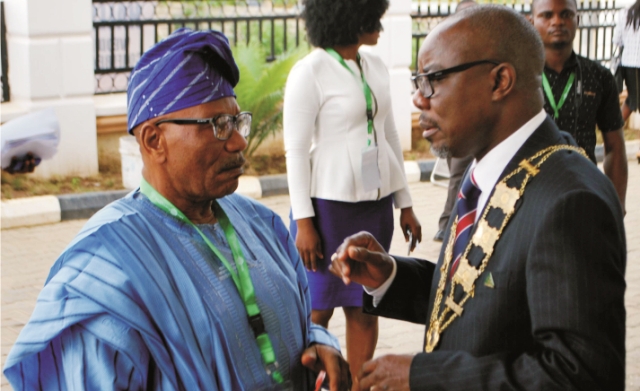Business
FG, USAID Launch New PPP Projects

The Federal Government and the United States Agency for International Development (USAID) have launched two new private sector-driven partnerships with local agribusinesses – Babban Gona and Hello Tractor, aimed at diversifying the economy and the development of Nigeria’s agriculture sector.
The project, launched by the Minister of Agriculture, Chief Audu Ogbeh, recently, highlights the US Government’s interest in helping Nigeria develop its agricultural potential, and boost the nation’s economy for the mutual benefit of both countries.
Ogbeh said that the initiative was in line with the Federal Government’s policy of using agriculture to boost economic revival through diversification aimed at creating employment and eradicating poverty.
Under the $2 million, two-year partnership, anticipated results include increased access to smart tractors, improved seeds, and profitable markets for over 45,000 smallholder farmers across seven states and the Federal Capital Territory.
Speaking during the ceremony at the US Embassy, Deputy Chief of Mission, Maria E. Brewer, described the partnership as a co-investment in public goods.
“Innovation and entrepreneurship hold the key to unlocking Nigeria’s agriculture potential, and the U.S. government will continue to provide support in this direction,” Brewer said.
The Tide gathered that under the Feed the Future initiative, the USAID partners with the private sector to support smallholder farmers in Nigeria.
Through these partnerships, USAID addresses development and business challenges by increasing access to improved agricultural inputs and mechanization, better quality technical advisory services, and expanding market opportunities for smallholder farmers.
These partnerships capitalize on the untapped potential of youth in agriculture and help build the capacity of young entrepreneurs to help grow their businesses, create secure jobs, and boost economic growth in Nigeria.
The Tide also learnt that the core targets of Babban Gona are to address the challenge of smallholder farmers by forming strong cooperatives called Trust Groups, which enable maize, rice, and soybean farmers to gain access to new markets and sell at premium prices.
Babban Gona further provides member farmers with services designed to optimize crop yields, production costs, and prices of agricultural outputs.
This business model helps to increase profitability of smallholder farmers and contributes to household food security and improved livelihoods.
It was gathered that through the partnership with USAID, Babban Gona will create positive impact for 20,000 smallholder farmers.
The Tide further learnt that Hello Tractor works to improve the need among smallholder farmers for consistent and sustainable mechanization services.
In line with that objective, Hello Tractor designed a versatile Smart Tractor with eight attachments to serve their needs throughout the farm production cycle.
Each tractor is fitted with technologies, which enable Hello Tractor to pair farmers in need of services with a Smart Tractor owner nearby via text messaging.
The technology allows small landowners access to affordable tractor services to increase their productivity, while Smart Tractor owners are given the opportunity to earn additional income with their machine.
Through the partnership with USAID, 24,500 smallholder farmers will gain access to tractor services.
The partnership expects to train 100 youth entrepreneurs on the business of owning and maintaining a fleet of Smart Tractors.
In addition, some 15 young technicians will benefit from trade skills to repair Smart Tractors.
Similarly, USAID partners to end extreme poverty and promotes resilient, democratic societies, while advancing security and prosperity.
In its partnership with Nigeria, the United States through USAID strengthens social stability with improved social services, supports transparent and accountable governance, promotes a more market-oriented economy, and enhances the country’s capacity as a responsible regional and trade partner.
It would be recalled that Feed the Future is a US Government policy born out of the belief that global hunger is solvable.
As the U.S. government’s global hunger and food security initiative, Feed the Future is transforming lives toward a world where people no longer face the agony and injustice of extreme poverty,
Transport
Nigeria Rates 7th For Visa Application To France —–Schengen Visa

Transport
West Zone Aviation: Adibade Olaleye Sets For NANTA President

Business
Sugar Tax ‘ll Threaten Manufacturing Sector, Says CPPE

In a statement, the Chief Executive Officer, CPPE, Muda Yusuf, said while public health concerns such as diabetes and cardiovascular diseases deserve attention, imposing an additional sugar-specific tax was economically risky and poorly suited to Nigeria’s current realities of high inflation, weak consumer purchasing power and rising production costs.
According to him, manufacturers in the non-alcoholic beverage segment are already facing heavy fiscal and cost pressures.
“The proposition of a sugar-specific tax is misplaced, economically risky, and weakly supported by empirical evidence, especially when viewed against Nigeria’s prevailing structural and macroeconomic realities.
The CPPE boss noted that retail prices of many non-alcoholic beverages have risen by about 50 per cent over the past two years, even without the introduction of new taxes, further squeezing consumers.
Yusuf further expressed reservation on the effectiveness of sugar taxes in addressing the root causes of non-communicable diseases in Nigeria.
-

 News3 days ago
News3 days agoDon Lauds RSG, NECA On Job Fair
-

 Niger Delta1 day ago
Niger Delta1 day agoPDP Declares Edo Airline’s Plan As Misplaced Priority
-

 Sports2 days ago
Sports2 days agoSimba open Nwabali talks
-

 Nation2 days ago
Nation2 days agoHoS Hails Fubara Over Provision of Accommodation for Permanent Secretaries
-
Niger Delta2 days ago
Stakeholders Task INC Aspirants On Dev … As ELECO Promises Transparent, Credible Polls
-
Niger Delta1 day ago
Students Protest Non-indigene Appointment As Rector in C’River
-

 Oil & Energy2 days ago
Oil & Energy2 days agoNUPRC Unveils Three-pillar Transformative Vision, Pledges Efficiency, Partnership
-

 Transport2 days ago
Transport2 days agoNigeria Rates 7th For Visa Application To France —–Schengen Visa

